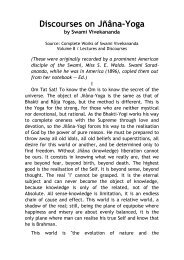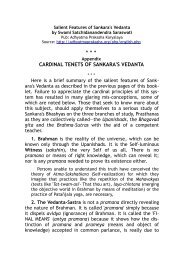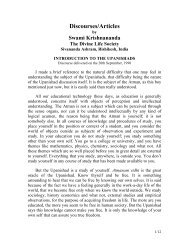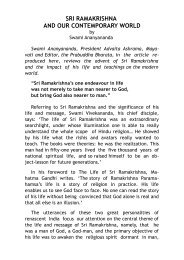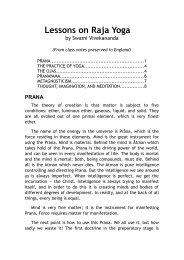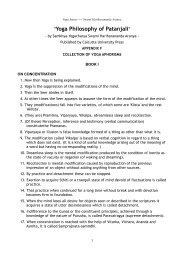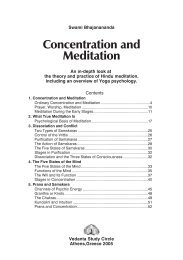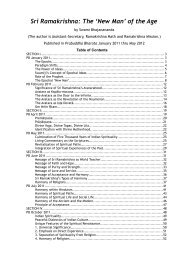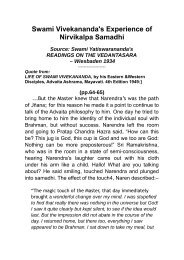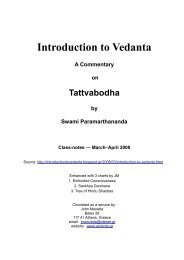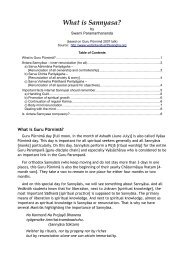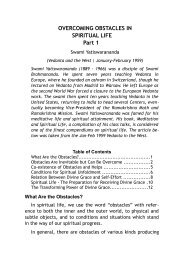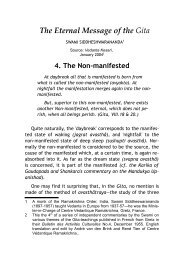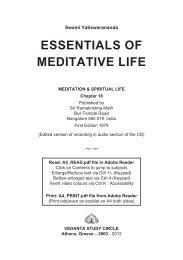Gita Summaries: Chapters 1-11 - Vedanta
Gita Summaries: Chapters 1-11 - Vedanta
Gita Summaries: Chapters 1-11 - Vedanta
You also want an ePaper? Increase the reach of your titles
YUMPU automatically turns print PDFs into web optimized ePapers that Google loves.
Swami Paramarthananda on <strong>Gita</strong> – <strong>Summaries</strong> of Chaps 1-<strong>11</strong><br />
expression and manifestation of God). So to see God, one need not go anywhere else if I<br />
learn to look upon any object in creation as God’s manifestation. To appreciate gold,<br />
where should you go Then you will discover gold in all the ornaments. Actually there is<br />
no ornament without gold.<br />
So, where do you see gold Your answer will be: How can you miss gold<br />
imilarly God is everywhere and not confined to just a place; we need not close our eyes<br />
or stand on one leg to see God. Through this wisdom born out of understanding you can<br />
see God everywhere. A person who understands God as a material cause will see the<br />
Lord everywhere in creation. Therefore learn to appreciate the world as God’s<br />
manifestation. All the glories of the world are only the special manifestation of the Lord.<br />
(Ordinary manifestation –bhuti–, and special manifestations –vibhuti–, categorized as per<br />
the maturity of the seeker).<br />
So whenever you see any glory in creation; one should remember it as Lord’s glory.<br />
Like when you see a great building; you remember the architect. Therefore every special<br />
object in creation becomes a means for worshipping the Lord.<br />
Arjuna asks for all the special manifestation and the Lord enumerates some of them.<br />
However, we shall mention only all the Vedic portions.<br />
The meaning of the word “Vibhuti” is cowdung and it is the abode of Lakshmi. Another<br />
meaning is ash; that which is left after everything has been burnt. What remains after<br />
everything is resolved in creation; the Lord.<br />
a) All the Vedas are manifestations of the Lord; Krishna says that among them I am<br />
Sama. While Rig is in form of poetical verse; Yajur prose, Sama is musical. Since music is<br />
attractive, Krishna identifies himself with Sama Veda.<br />
b) Veda Vidya: Veda Purvah [Earlier Portion of Veda] is the section of Vedas that stems<br />
from the premise: how to manipulate jagat [world] to be happy Here one is trying to<br />
change one’s wife, get a job, house etc. You take your horoscope to various astrologers<br />
and each one will say differently and different appeasement rituals, Adjusting the world<br />
or planets is an unintelligent approach. Even should something change, it will not remain<br />
that way, for the world keeps on changing.<br />
In <strong>Vedanta</strong> [End Portion of Veda] one does not seek to change the world, but oneself. I<br />
must have the inner strength not to be affected by circumstances. It is like walking<br />
wearing shoes on a pebble pathway.<br />
So, among Veda Purvah and <strong>Vedanta</strong>, I am <strong>Vedanta</strong>; being Para Prakriti and Apara<br />
Prakriti, I am Para Prakriti<br />
c) Among Vaidika yagna [Vedic sacrifices], I am japah [practice of unceasing repetition<br />
{of certain words and sounds)]. Why<br />
- Easily accessible to all without discrimination of gender, varna [caste], or ashrama<br />
[stage of life].<br />
30



